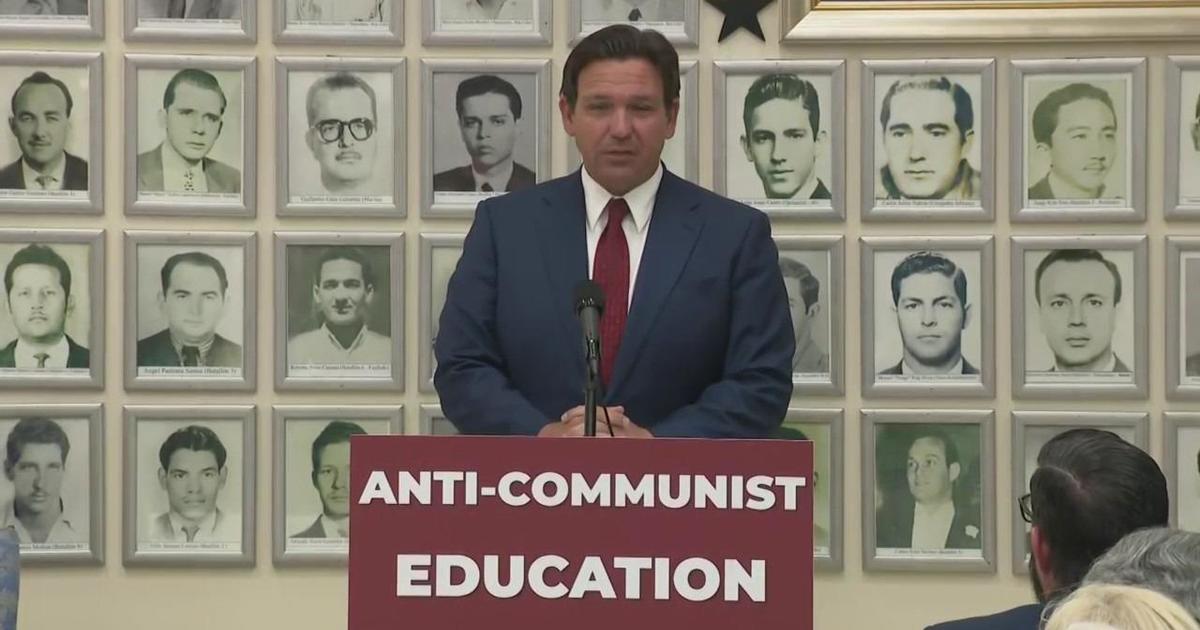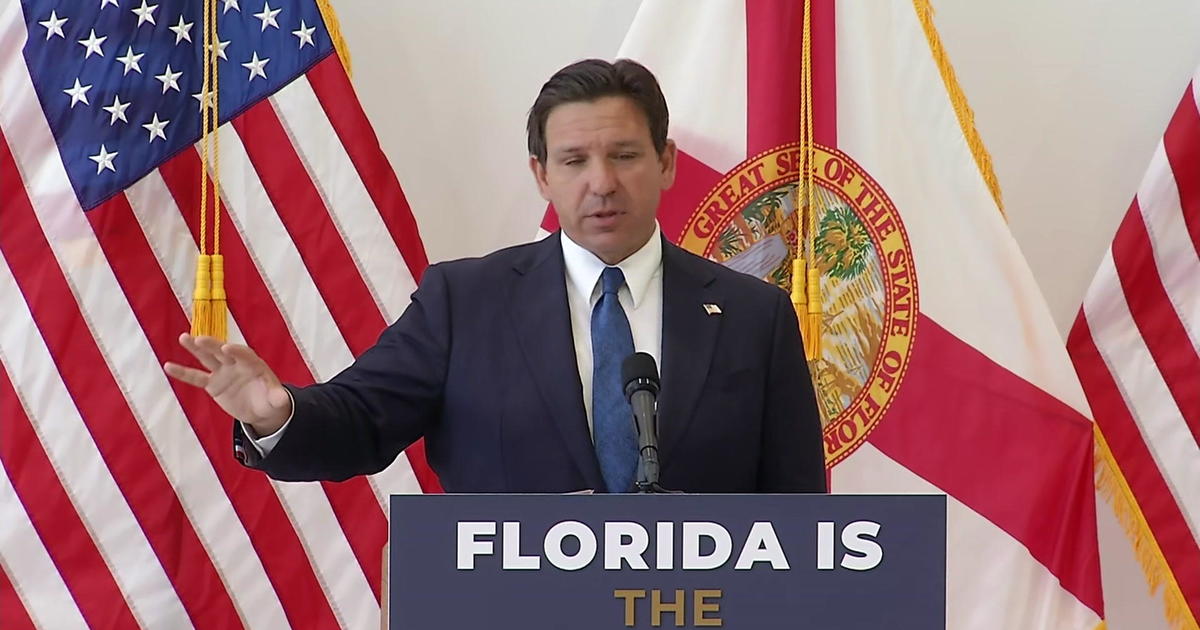Gov. DeSantis brought "Courage" book tour to South Florida
MIAMI - Governor Ron DeSantis brought his "The Courage to Be Free" book tour to South Florida on Wednesday morning.
The governor spent about an hour talking to his supporters at The Fire Tower in Doral while touting his new book. He spent a lot of time discussing his achievements as the state's leader, and at times criticizing President Joe Biden's policies.
During his speech, he touched on his fight with Disney, education, and the pandemic.
Many state Democrats have criticized DeSantis for his choice to release the book and go on tour when the legislative session is set to begin next week.
The governor addressed that in his speech, saying he plans on getting a lot more done in Florida.
"With our legislative session coming up next week, we have an opportunity to tackle more issues in a short period of time than we were able to do in any of the four years so far," he said.
The governor is expected to make several stops in Florida, as well as states across the country, to discuss his memoir.
DeSantis' 256-page book offers some new insights into his upbringing, college years and military service. But mostly, he writes about his contentious four years as governor and suggests he has laid a path for others to follow.
"The battles we have fought in Florida -- from defeating the biomedical security state to stifling woke corporations to fighting indoctrination in schools -- strike at the heart of what it means to be a Floridian and an American," DeSantis writes.
The book's release has coincided with the soft-launch of the Republican's presidential campaign and it ends with a forward-looking note that alludes to the next challenge ahead.
"The Florida Blueprint is a simple formula: be willing to lead, have the courage of your convictions, deliver for your constituents, and reap the political rewards. This is a blueprint for America's revival. We've shown it can be done," he writes.
DeSantis (gently) pushes back against Trump
DeSantis largely avoids direct confrontation with former President Donald Trump, whom he praises for his "unique star power," "massive following" and "filling the void that GOP leaders had left by ignoring the preferences of their own voters." He continued his defense of Trump's 2016 campaign against investigations for Russian election interference.
But DeSantis expended considerable ink challenging Trump's version of the 2018 Florida governor race to claim back credit for his victory.
Trump has claimed DeSantis "begged" for a gubernatorial endorsement in the Republican gubernatorial primary -- shed tears even. Before Trump got involved, DeSantis was "dead" and "leaving the race," the former president recently told conservative radio talk show host Hugh Hewitt.
DeSantis recalled asking Trump in late 2017 "if he would be willing to send out a tweet touting me as a good candidate for Florida governor." Trump, DeSantis said, "seemed amenable, but at the same time, I was not holding my breath."
Trump did tweet about DeSantis, calling him "a brilliant young leader" and playing up the then-congressman's Ivy League credentials.
In DeSantis' telling, he recognized the power of Trump's endorsement but suggested its appeal was limited.
"I do not think Republican primary voters are sheep who simply follow an endorsement from a politician they like without any individual analysis, but I do believe that a major endorsement can put a candidate on the radar of GOP voters in a way that boosts a good candidate's prospects," he writes.
DeSantis later says it was his debate performance, not Trump's support, that led to a reversal in the polling. He omitted, though, that Trump had tweeted a more forceful "full endorsement" of DeSantis just two months before the primary. Nor did he note that Trump sent a team of Florida operatives to help DeSantis' campaign after the primary.
Throughout the book, DeSantis finds more opportunities to undercut the former president. At several points, DeSantis bemoans the lack of activity in Trump's first two years in office, when Republicans controlled the House and Senate. Though he doesn't blame Trump explicitly, when juxtaposed against his own record compelling Republican lawmakers in his state to act repeatedly in service of his agenda, the implication seems clear.
"Here we had a unified Republican government for the first time in more than a decade, and yet so much of the time was frittered away on matters like the conspiracy theory that Donald Trump's campaign had colluded with Russia, which GOP-led committees investigated for two years," he writes. "Why Congress didn't do more significant things, such as appropriating money to build the wall at the US-Mexico border, was beyond me."
Inside the feud with Disney
DeSantis' book frames his battle with Disney as a demarcation line in his political story. It's mentioned on the second page of the introduction. The juiciest excerpts from that particular chapter (which he labeled "The Magic Kingdom of Woke Corporatism") were released in advance to Fox News. And, in a symbolic move, he signed the bill to remove Disney's special governing powers Monday, the eve of his book's release.
DeSantis' views his own political feud with the company as somewhat ironic, given that he married his wife in Disney World. He also is quite clear that his wife, Casey, who hailed from "a family of Disney enthusiasts," was the catalyst for the location of their nuptials.
"My only condition was that no Disney characters could be part of our wedding," he wrote. "I wanted our special day to look and feel like a traditional wedding. I didn't want Mickey Mouse or Donald Duck in our wedding photos."
His relationship with Florida's largest employer broke down last year as outrage intensified over a Florida bill to limit the instruction of sexual orientation and gender identity. DeSantis recalled then-Disney CEO Bob Chapek told him during a phone call that he did not want to get the company involved but was under pressure to weigh in.
DeSantis urged Chapek to steer clear and suggested the blowback would pass in 48 hours once there is "some new outrage that the woke mob will focus on."
"You will end up putting yourself in an untenable position," he recalled telling Chapek. "People like me will say, Gee, how come Disney has never said anything about China, where they make a fortune?'"
Disney ultimately weighed in, saying in a statement that it was "dedicated to standing up for the rights and safety of LGBTQ+ members of the Disney family, as well as the LGBTQ+ community in Florida and across the country." And DeSantis pounced, as he said he would.
To DeSantis, the episode is a microcosm of a greater struggle between the fight conservatives expect from GOP leaders and the instincts of Republicans not to meddle in the affairs of businesses. DeSantis argues, "In this environment, old-guard corporate Republicanism is not up to the task at hand."
"Unfortunately, the sad upshot of these changes is that corporate America has become a major protagonist in battles over American politics and culture. The battle lines almost invariably find large, publicly traded corporations lining up behind leftist causes," he writes. "It is unthinkable that these large companies would side with conservative Americans on issues such as the Second Amendment, the right to life, election integrity, and religious liberty."
DeSantis vs. DeSantis
DeSantis' first book, the little-read "Dreams from Our Founding Fathers" published in 2011, is a case for limited government, separation of powers, humble leadership and executive constraint. DeSantis' latest book is a defense of his most contentious executive actions, achieved by consolidating power and flexing executive authority, in ways that suggest he has undergone an evolution of his previous principles.
In "The Courage to be Free," DeSantis -- the former star athlete and Naval officer -- demonstrates a tactical precision for using his executive powers in ways intended to keep Democrats and the media off guard in pursuit of an aggressive and partisan agenda. He brought to the job, he writes, "an understanding of how a constitutional form of government operates, the various pressure points that exist, and the best way to leverage authority to achieve substantial policy victories."
"One of my first orders of business after getting elected was to have my transition team amass an exhaustive list of all the constitutional, statutory, and customary powers of the governor. I wanted to be sure that I was using every lever available to advance our priorities," he writes.
DeSantis, looking to jumpstart his political career in 2011, eviscerated then-President Barack Obama for what he described as executive overreach. He accused Obama's then-health and human services secretary, Kathleen Sebelius, of using "her power to intimidate private businesses for engaging in speech she didn't like." He wrote Obama was "resorting to using crude vulgarisms, such as the term 'teabagger,' to describe their fellow citizens simply because these citizens dissented from progressive orthodoxy."
But in "The Courage to Be Free," labeling corporations as "woke" and punishing those that speak out "is not only prudent but necessary to counteract efforts by large corporations to impose a woke agenda on the rest of us."
As DeSantis writes: "It is regrettable that our nation has become so politicized, but the fact is that private companies wielding de facto public power is not in the best interests of most Americans."
Continuing to litigate his coronavirus response
DeSantis built his reelection for governor around his response to Covid-19 and his book makes clear he will continue to make that a part of his message as he looks toward a potential campaign for president.
As he often does, DeSantis described Florida as a "citadel of freedom in the United States," and defended his actions to reopen schools for the 2020-2021 school year.
"When I announced Florida's back to school policy, perhaps because I did so during the height of the summer COVID-19 wave, there was substantial public opposition to my decision," DeSantis says. "For all the controversy that swirled around my decision, and all the incoming fire I took by making it, there was never a doubt in my mind that keeping our schools open was right for our state."
"Keeping Florida Free" from Covid-19 restrictions has earned DeSantis criticism from Democrats and health experts -- a badge he proudly wears. But DeSantis also puts up his response against the rest of the country, even Trump, who he noted stood behind health officials who pushed states to shut down activity for two weeks to slow the spread.




